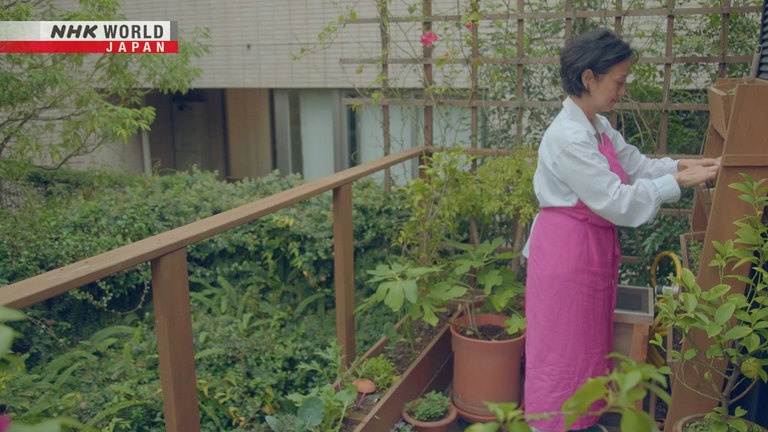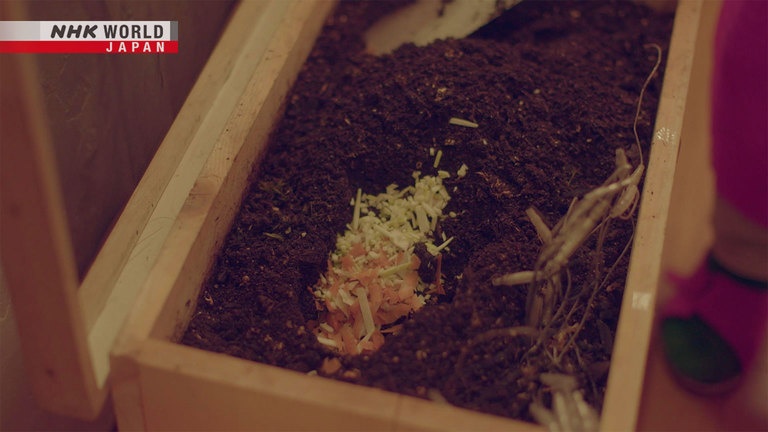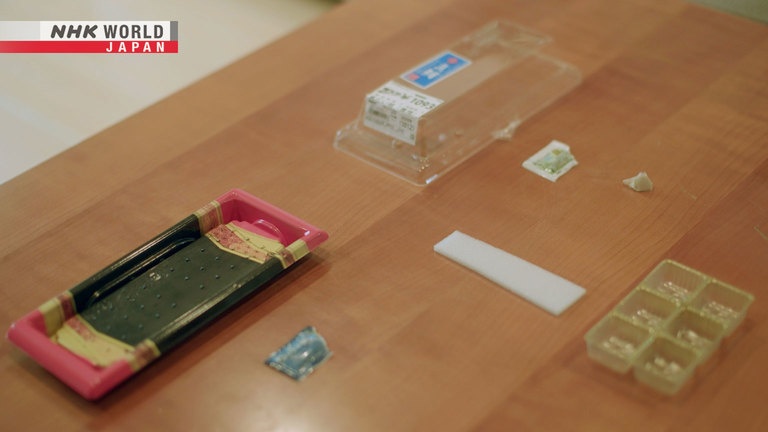Life Less Plastic
Takasago Masami generates almost no plastic waste. Composting instead of plastic bags for food scraps, or doing dishes with a cloth instead of a disposable sponge; little ideas that are fun and easy.




Transcript
Since ancient times, the Japanese have believed that a life force resides in all creations.
Valuing and caring for the things we use, a "Zero Waste Life."
Pointing the way to better living for a new era.
Plastic waste has to be reduced.
There must be some way that
I can do something about it.
Drink bottles, plastic bags; conveniences many in the modern world can't live without.
But the other side of the convenience plastics provide
is that their mass disposal has also led to serious environmental problems.
Tokyo's Shibuya district.
In a quiet corner of a nearby residential area,
one woman is striving to live a life without plastic waste.
Her name is Takasago Masami.
The fish we ate yesterday came on this tray,
and they put it in a bag without even asking.
I didn't notice since I was paying.
She keeps a visual record of her daily plastic waste.
Here, she takes a photo of her garbage from the previous day.
I once went on a diet where you take
photos of the food you eat each day
that worked really well for me.
I thought, why wouldn't the same thing
work for reducing the garbage I make.
A homemaker, she began her waste-conscious lifestyle four years earlier.
Let's follow along on an average day for this family of three.
In the morning, she waters the plants.
Japanese chervil, and various herbs.
There's arugula and coriander too,
as much as possible, things we can eat.
Her garden has a wide variety, including leafy greens and citrus fruits.
Store-bought vegetables usually come
wrapped in plastic.
If you grow enough for your daily meals,
it's a good way to reduce plastic waste.
She's also particular about household chores.
For washing dishes: not a sponge, but a rag.
Disposable sponges release microplastics
when you use them for washing dishes.
But dishrags also turn out to be
better at getting things clean.
And for things that are harder to clean...
Whenever I have organic citrus fruits,
I use the rinds to make a spray.
Lemon extract instead of commercial detergent.
Its natural properties are ideal for stain removal.
Eco-friendly products often
don't smell of anything at all.
With this, there's no waste,
and it smells fantastic.
It's a lovely aroma.
At noon she heads out to do the shopping.
Hello!
She's come to a nearby tofu shop.
Thank you.
- Fried tofu too, please.
- Okay, coming up.
For shopping she brings her own containers,
avoiding disposable cartons and bags as much as possible.
I carry them with me everywhere.
She's happy to oblige my request,
so I always buy my tofu here.
Takasago tries all kinds of ways to reduce the waste she produces,
but things don't always go according to plan.
Today, she also bought groceries at the supermarket,
but all the fruits and vegetables were pre-wrapped in plastic.
Around here there are few places
to shop without getting any plastic.
The more I learn about plastics,
the more I'm sure they're something
that we can really do without.
Takasago loves the sea, and used to work for a nature magazine publisher.
There, she met and married Takasago Junji, a marine photographer.
While accompanying him on photoshoots around the world,
she witnessed the harm done to marine life by plastics firsthand.
This photograph was taken on Midway Island in the North Pacific.
It was a baby albatross with a stomach
full of plastic. That was a big shock.
I wondered what I should do.
Her awareness of the problems surrounding plastic use grew even stronger as she became a homemaker.
When I heard about the harm that
plastic also does to the human body,
I realized just how bad things were,
and decided to do something about it.
She first began her efforts in 2019, with the start of her plastic waste photo journal.
When I took that first photo,
there was so much trash
that there wasn't enough room
to lay it all out properly.
But it really made me more aware
of the problem.
The record made her reevaluate her own way of life,
inspiring new ideas for living waste-free.
And the amount of garbage she created steadily decreased.
Evening, and it's time to prepare dinner.
- Like this?
- That looks about right.
Dinner is usually prepared together as a family.
They harvest just enough of the plants they grow to eat, adding them to the other ingredients...
...like the tofu in the reusable container that she bought earlier.
The salad looks nice.
Let's eat.
A life without the plastic waste has become their everyday norm.
But how does the rest of the family feel about it?
It's pretty difficult really, finding food
that doesn't come wrapped in plastic.
I'm impressed that mom has been
able to do it at so many places.
There may have been times I wasn't
able to eat something I wanted to,
but it's been a real inspiration
and a great opportunity for me.
Once you get started on something,
you really go all in.
- Stop, you're embarrassing me!
- But I think it's a wonderful way to be.
After-dinner cleanup also has a clever twist.
She composts food waste instead of throwing it away in a plastic bag.
It's really just a small thing,
but the more households that do it,
the more we can reduce plastic waste.
After posting her photo of their plastic waste, her day is now done.
- Hello.
- How've you been?
Today a group has gathered at Takasago's home.
The table is covered with old newspapers.
Takasago regularly holds sessions like this with friends living nearby to make paper bags.
As a substitute for plastic bags,
I came up with using newspaper.
I took a class and started doing it.
Leave about 2 or 3cm sticking out
so it can be pasted down later.
No problem. It looks good.
They use the bags themselves or give them to neighborhood shops to use instead of plastic bags.
Doing it as a group is more fun,
and also efficient.
You're using your hands and chatting.
Even as I get older, I plan to keep it up.
With work done, it's time for lunch.
Naturally, she has more clever ideas to share.
This is a really handy tip.
Wrap your rice balls up like this,
using a damp cloth.
I use as little plastic wrap as I can.
She's really influenced me.
Little by little, without too much fuss,
I try to make it fun.
One person makes a big difference.
So I think that's very amazing. I think that's Masami-san.
I think she's just showing how easy, and how amazing one person can be.
Day by day, Takasago works to help make a world without plastic waste.
For her, one thing is most important.
Never believe you have to be perfect.
Blaming yourself only makes it harder.
Make it fun and keep it easy.
If there's even one less piece of trash,
then that's a positive change.
It all makes a difference.